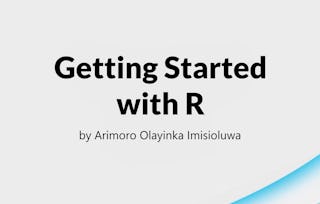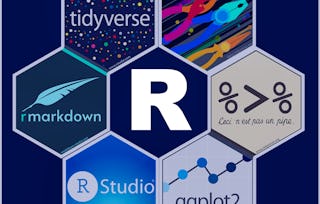This guided project is for beginners interested in taking their first steps with coding in the statistical language R. It assumes no previous knowledge of R, introduces the RStudio environment, and covers basic concepts, tools, and general syntax. By the end of the exercise, learners will build familiarity with RStudio and the fundamentals of the statistical coding language R.

Introduction to R: Basic R syntax

(49 reviews)
Recommended experience
What you'll learn
Run your first code in the statistical programming language R
Learn how to create objects and vectors in R and assign values to them
Skills you'll practice
Details to know

Add to your LinkedIn profile
Only available on desktop
See how employees at top companies are mastering in-demand skills

Learn, practice, and apply job-ready skills in less than 2 hours
- Receive training from industry experts
- Gain hands-on experience solving real-world job tasks
- Build confidence using the latest tools and technologies

About this Guided Project
Learn step-by-step
In a video that plays in a split-screen with your work area, your instructor will walk you through these steps:
-
Learn about the statistical programming language R and the RStudio environment. Execute your first lines of code in R
-
Learn how to run basic arithmetic operations in R, and learn about functions in R, a few base functions in particular, and how to access their relevant documentation to learn more about how they work
-
Create objects in R and assign them values. Use objects as inputs for functions in R, and store the outputs of these functions in new objects
-
Learn about vectors and how to Create them. Run mathematical operations on vectors
-
Create vectors with text characters. Use basic functions to create vectors, and learn about logical operators to compare values
Recommended experience
No prior knowledge of R required
3 project images
Instructor

Offered by
How you'll learn
Skill-based, hands-on learning
Practice new skills by completing job-related tasks.
Expert guidance
Follow along with pre-recorded videos from experts using a unique side-by-side interface.
No downloads or installation required
Access the tools and resources you need in a pre-configured cloud workspace.
Available only on desktop
This Guided Project is designed for laptops or desktop computers with a reliable Internet connection, not mobile devices.
Why people choose Coursera for their career

Felipe M.

Jennifer J.

Larry W.

Chaitanya A.
Learner reviews
- 5 stars
63.26%
- 4 stars
30.61%
- 3 stars
2.04%
- 2 stars
2.04%
- 1 star
2.04%
Showing 3 of 49
Reviewed on Oct 1, 2021
It's good to clarify what are the benefits/differences to other applications like using EXCEL as we are beginners.
Reviewed on Feb 24, 2023
The content was less than I expected but quality over quantity.
You might also like

Coursera
 Status: Free Trial
Status: Free TrialUniversity of Colorado Boulder
 Status: Free Trial
Status: Free TrialJohns Hopkins University
 Status: Preview
Status: PreviewMicrosoft

Open new doors with Coursera Plus
Unlimited access to 10,000+ world-class courses, hands-on projects, and job-ready certificate programs - all included in your subscription
Advance your career with an online degree
Earn a degree from world-class universities - 100% online
Join over 3,400 global companies that choose Coursera for Business
Upskill your employees to excel in the digital economy
Frequently asked questions
By purchasing a Guided Project, you'll get everything you need to complete the Guided Project including access to a cloud desktop workspace through your web browser that contains the files and software you need to get started, plus step-by-step video instruction from a subject matter expert.
Because your workspace contains a cloud desktop that is sized for a laptop or desktop computer, Guided Projects are not available on your mobile device.
Guided Project instructors are subject matter experts who have experience in the skill, tool or domain of their project and are passionate about sharing their knowledge to impact millions of learners around the world.

